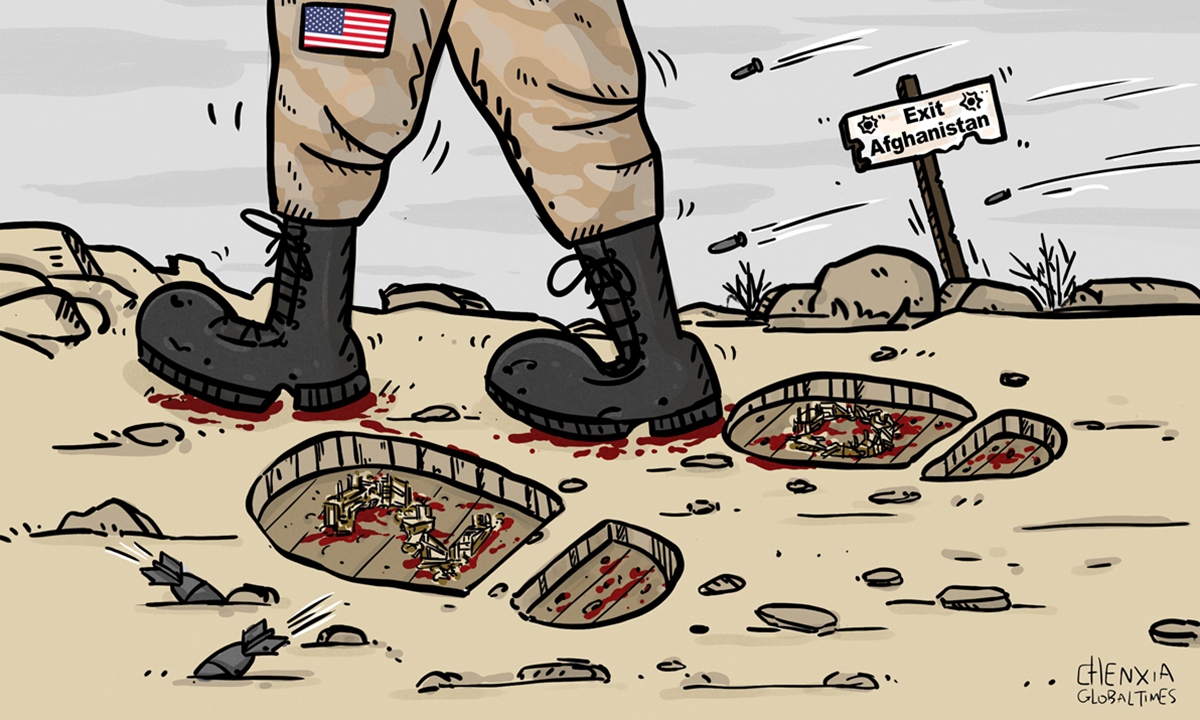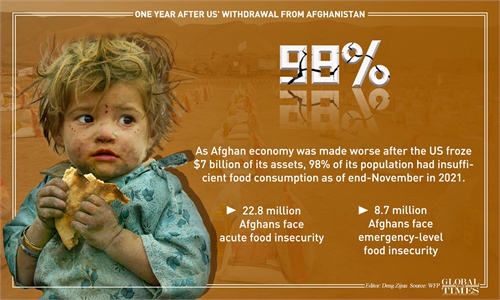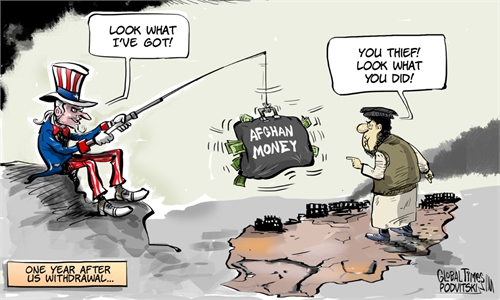One year after Kabul debacle, US attempts to sustain hegemony at cost of the whole world

Illustration: Chen Xia/GT
One year ago, the US hastily and embarrassingly withdrew from Afghanistan. Now, the scene of that fiasco still lingers in many people's minds. But a year later, the US did not draw lessons from a war it had failed. What the world sees is since the Kabul moment, the US has been mobilizing its resources to target China and Russia at the cost of the whole world.US President Joe Biden delivered three speeches in April, July and August last year respectively on the US withdrawal from Afghanistan. Besides looking for a decent excuse for the disgraceful withdrawal, all the three speeches blatantly raised the true intent of the US - the US needs to focus on shoring up America's core strengths to meet the strategic competition with China, and Russia.
In Ukraine, the US as the instigator of the Russia-Ukraine conflict keeps fanning the flames by providing weapons to Ukraine in a bid to deplete the strength of Russia, in disregard of the development of Ukraine and the wellbeing of the Ukrainian people. Even the interests of US' European allies were sacrificed by the US as a stepping stone to consolidate its global hegemony.
With no end in sight of the Ukraine crisis, the US is trying to ignite another clash in Asia. After US House Speaker Nancy Pelosi visited Taiwan island on August 2, a delegation of five US lawmakers arrived on the island of Taiwan on Sunday. By provoking a conflict in the Taiwan Straits, the US is hoping to rally its resources in Asia, contain China's development, and undermine security in Asia.
Now the US, a superpower in its downfall, can only retain its hegemony by creating confrontations and dragging a large number of countries into the muddy water. The US is no longer able to bring the world peace, stability and development, but only engages in messing around the world. Sun Xihui, an associate research fellow with the National Institute of International Strategy at the Chinese Academy of Social Sciences, believes that provoking major powers like China and Russia is one means through which the US destabilizes the world, and sowing confrontation based on ideology is another.
"The US divides the world with the so-called 'values.' On the one hand, it relentlessly labels countries that it deems could challenge the Western order as 'autocracies,' and on the other hand, it tries hard to convince Western countries and non-Western countries which accept Western values to buy such a view, thus intensifying division among the international community with this 'autocracy vs democracy' narrative. As the US brings about chaos, the deep anxiety over its hegemony and the order it once dominated is fully exposed," said Sun.
According to Xu Liang, an associate professor at the School of International Relations of Beijing International Studies University, now the US is a "sick man" who is desperately looking for a therapy like a headless chicken, as if it could find its past health if the world is in chaos.
"The US has found it hard to sustain its hegemony, as sustaining it is too costly for the US now. The US has passed its peak, with its withdrawal from Afghanistan marking the beginning of the decline of US strength. The impetuous moves of the US over Ukraine and Taiwan question prove that the US has fewer and fewer political options," said Xu.
Xu noted that the logic behind US' actions to mess around the world is that as the US declines, the world can be exploited as expendable. The US only wants other countries to coordinate with its national interests to contain China and Russia, which, after all, is nothing but a fantasy.
The US is still a global hegemon, but a discouraged one. From a short-term point of view, a discouraged hegemon can still generate momentary destruction, but from a long-term perspective, it will only consume all of its energy. It is a process in which US' influence declines and its reputation gets tainted.


